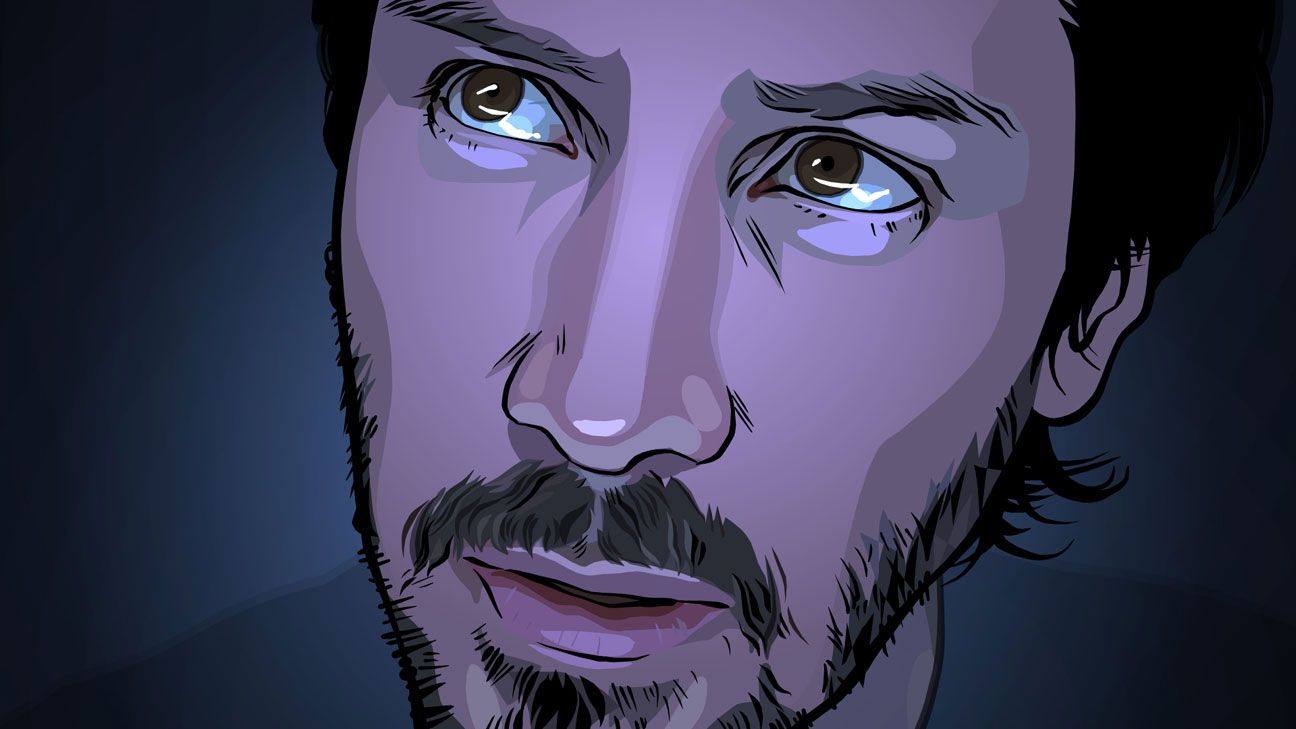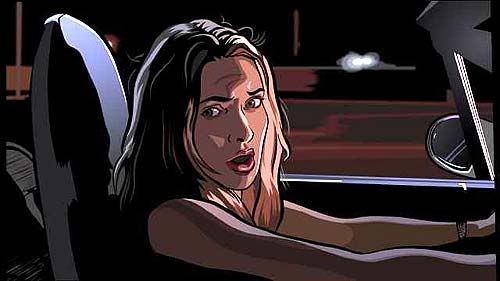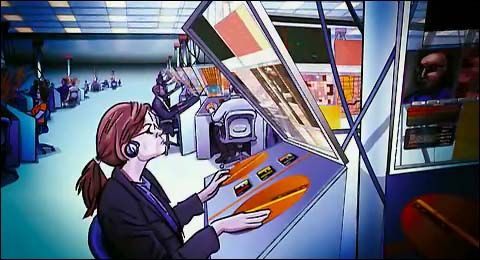A Scanner Darkly

The scramble suit was described as a grey, amorphous membrane to readers of Philip K Dick's 1977 dystopian classic but to viewers of Richard Linklater's big screen adaptation the scramble suit is an ever-changing canvass animated by misdirection. This is the most faithful Dick film translation, not only in plot terms but the feeling found throughout Dick’s career of striving not to get flushed down the rabbit hole. It’s easy to let the ballyhooed animation technique get in the way of the story and distract the viewer (especially in a poor auditorium) but its intention is neither arch nor superfluous. We’re meant to question the reality we’re given, as in many works by both Dick and Linklater. And that’s what makes this marriage so fanboy sweet: the guy who made Waking Life and Before Sunset is going Sci-Fi to adapt Philip K Dick’s (possibly) best novel. The ever hip Salon.com has said “There’s no other filmmaker, living or dead, who could produce a futuristic sci-fi nightmare, a hipster comedy, a haunting film noir and a cartoon, all in the same movie.”
Yet Linklater sidesteps self aware glibness with the animation concept: from the outset we cannot help but question this world we're presented with and, ultimately, the story’s embedded metaphors about identity and reality extend to, and embody, the film as a whole. What scramble suit am I wearing today? Should I shave my beard? What would you see looking into my mask?
We meet Keanu Reeves first as Agent Fred, shrouded by his suit, addressing a room about the benefits of the rehab clinic called A New Path. The constantly shifting skin that covers Fred is the first show-off spectacle we’re given but it’s treated as a given so we soon forget its trickery and accept its random oddity as a norm. Fred stops his speech halfway through, pausing his projected voice to complain to his boss from within the suit that he can’t stand the smell of useless propaganda in the script, and walks out of the room, his scramble suit and the police station. Once outside we see him on a scanner’s monitor as Bob Arctor, the name his dealer on the phone, and his junkie roommates, know him by. Later, we learn that Fred has been assigned to investigate Arctor by a superior called Agent Hank and is given free reign to edit himself out of the surveillance tapes of his home to further cloud his “true” identity and drift into obscurity—from himself, his friends, his world. While this sounds confusing, and it is by design, the film is fairly easy to follow despite all the madness onscreen plot-wise and structure-wise and drug-wise. Like a lot of Dick novels, and Linklater films, A Scanner Darkly is more about metaphysical dilemmas than plot so the misdirection works perfectly and we get lost in the fear of our protagonist, neglecting the “real world” problem of finding the source of the drugs. Critics routinely harp on Dick’s prose, not his plotting; the plot is secondary to his philosophical ambitions but not ignored.
The downward spiral of Arctor is perpetuated by a drug called Substance D (or Death or plain old D) which, much like Dick’s nemesis methamphetamines, is instantaneously addictive and degenerative. The film opens exactly as the novel does, witnessing Charles Freck—Rory Cochrane upping the manic ante on his stoner Slater character from Linklater’s Dazed and Confused—scrubbing and spraying himself and his dog to clean off imaginary aphids he’s convinced are plaguing his junkie-filthy apartment. And how does he counterattack this nightmare vision? He enlists the talkative, always in overdrive, Barris (an inimitably energetic Robert Downey Jr) to help him score cocaine from “Bob’s girl”, and aforementioned dealer, Donna. Winona Ryder plays Donna with unexpected depths as a cold coke head who can’t stand to touch anybody because of her inescapable addiction. After her shoplifting scandal demoted her from her celebrity pedastool now occupied by the ever-rising Anne Hathaway, Ryder's scars work to add a new dimension of weariness to her often plain jane acting style of before.

Linklater has been fascinated by fast talkers, slow talkers & non talkers since his first films and it’s no surprise that the majority of the film relies on idiot banter from this core of junkies. (“That bike has 9 gears, not 18! Six there and three there, that’s 9!”) Often these scenes appear to go nowhere but Linklater's affinity for, and knowledge of, day-to-day dialogue rhythms--not the off kilter animation--hold the audience's attention piqued, ready for this world to wrench awry at any minute. The tension cannot match Before Sunset's countdown desperation or Dazed and Confused's teen agnst but the random junkie idiocy on display in Arctor's living room and the police state outside where you'll get thrown in a van for dissent was enough to carry me along down the drainhole with these manic dolts.
The casting of notorious Hollywood bad boys with drug histories is yet another stroke of formalist genius: maybe Robert Downey Jr, Woody Harrelson and Keanu Reeves would, in fact, be happy to sit around all day getting high. Which would be the narc? Would it be the guy who spent the 90s as a target for “don’t be River Phoenix”; the guy who hung himself off the Golden Gate Bridge for hemp rights; or the guy brought out of The Matrix—chosen, in fact—to bring balance to our shaky celluloid CGI reality? Yeah, probably that last one. However, whether his movie star presence balances our film world is up for debate.
Dick’s own drug addled demons are on full display as well (both on the page and on screen) and as much as this film is about surveillance, the real attack is on the drug market from addicts to dealers to suppliers. Linklater retains the novel’s ending—to go along with its opening—and the requiem for all of Dick’s fallen friends, victims of the labyrinth world they only clouded with drugs. It’s not quite a scared straight morality tale where we vow to better ourselves, it aims to keep you asking question after question after question: nothing in this bleak (yet unmistakably funny) world can be certain and you damn yourself to take anything at face value, especially if its face is a scrambled stew of lies that never ceases to morph anew. There’s no stopping this, no matter what. Do your best. And don’t hide: it won’t help.

02006: 100 minutes: dir. Richard Linklater: written by Linklater from Philip K Dick's novel




shit was boring. nothing can top 'blade runner' for my money. and nona was atrocious. i don't know how you thought she had "depth" or whatever...
ReplyDeletethe animation was neat, tho.
i won't watch this. winona ryder should be captured and shot for her crimes against taste
ReplyDeleteI agree it was dull in spots but the actors were never dull. Except maybe Winona, yeah. I think most people give her a pass on the acting tip (and even nominate her for Oscars) because she's so pretty. I mean, LITTLE WOMEN? C'mon...
ReplyDeleteAs for SCANNER: it may not be as perfect a marriage as I claim, and it's certainly not perfect, but I was engaged the whole way through. I found it worth my $10.75, actually. Especially in a season where PIRATES 2 rakes in such egregious sums.
It's funny how in two years I've come to love those _Pirates_ sequels and really dig this flick not for its faith to Dick but for its very engagement with "the image", with film and pictures and how that changes storytelling. Also, it's really cool to think about the steps in Robert Downey Jr's career from this picture to _Zodiac_ to _Iron Man_.
ReplyDelete